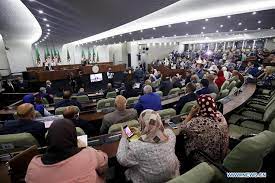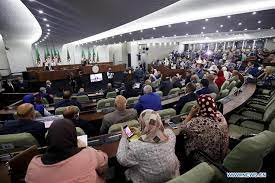The house of representative is the People’s National Assembly abbreviated APN, is the lower house of the Algerian Parliament. It is composed of 407 members directly elected by the population. Of the 407 seats, 8 are reserved for Algerians living abroad Members of the People’s National Assembly are directly elected through proportional representation in multiple-member districts and serve terms lasting five years at a time. The People’s National Assembly has less power relative to the executive branch than many parliaments and has been described as “rubber-stamping” laws proposed by the president. As of 2012 there were 462 seats in parliament. In the May 2012 election the government reported a 42.9% turnout, though the BBC reported that correspondents saw “only a trickle of voters” at polling places. In that election 44 political parties participated with the ruling National Liberation Front winning more than any other group—220 seats—and an alliance of moderate Islamists coming in second with 66 seats. The Islamists disputed the results. The last election for this body was held on 12 June 2021.The minimum age for election to the Assembly is 28.
There are 58 districts, and an overseas constituency, which send representatives to this body. The current speaker of the APN is Ibrahim Boughali, an independent member. The minimum age to vote in Algeria is 18 and voting is not compulsory.
HISTORY
The first election for the People’s National Assembly was held on 20 September 1962. In 1963, the President of the Republic of Algeria, Ahmed Ben Bella, halted the activities of the APN and set up a Revolution Council lasting from 1965 to 1976. The APN was reestablished in 1976 with the passage of Algeria’s new constitution, at the time only a unicameral legislature Up until 1991, the ruling party was the National Liberation Front (FLN), and in fact, the 1976 Algerian constitution considered the FLN as the preferred Algerian political party the first APN election with multiple parties was held in December 1991. After a predicted Islamic Salvation Front (FIS) victory, a fundamentalist opposition party, the Algerian People’s National Armed Forces canceled the elections. A substitute legislative body, the National Consultative Council, was established in April 1992 and lasted until May 1994, when the National Transitional Council ruled for until the next elections, held on 5 June 1997. In 1996, the legislature split into two chambers forming the Algerian Parliament with the ratification of a new constitution.
Women in Parliament
After the 1997 elections, women composed 3.4% of APN members.
By 2012, Algerian women occupied 31 percent of parliamentary seats, placing the country 26th worldwide and 1st in the Arab world.

ROLE
The People’s National Assembly is an institution of the Republic and, together with the Council of the Nation, forms one of the chambers of the Parliament. As such, it votes the law, monitors government action and evaluates public policies. Its powers are fixed by the Constitution.
DISSOLUTION
The President of the Republic can dissolve the People’s National Assembly, and the only one authorized to do so. According to article 147 of the Constitution, the President of the Republic can decide on the dissolution of the National People’s Congress or on early legislative elections, after consultations with the President of the APN, the President of the Council of the Nation and the Prime Minister.
ELECTORAL SYSTEM
The National People’s Assembly is made up of 407 seats filled by multi-member proportional representation in 58 constituencies corresponding to the wilayas (provinces) of the country, with an additional overseas constituency. Each constituency is allocated a number of seats according to its population, with a minimum of three seats per constituency. After counting the votes, the seats are distributed according to the largest remainder method, without an electoral threshold.
Before the 2021 election (which was the first after 10 new provinces were created in 2019), there was a constituency for each of the 48 provinces, plus four constituencies for Algerians living overseas. The province-based constituencies were guaranteed a minimum of four seats each.


